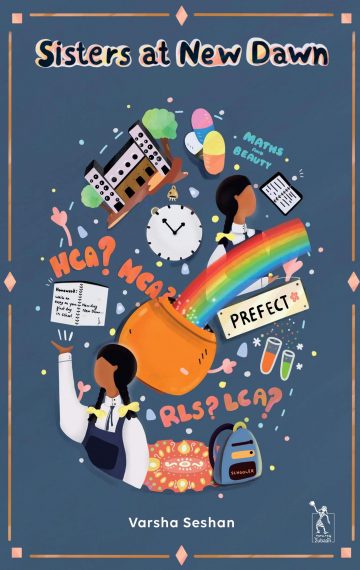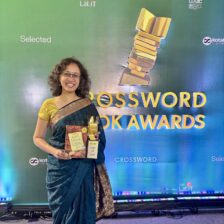
- Publisher: Zubaan
- Edition: First edition
- Available in: Paperback, EPub
- ISBN: 978-93-8593-265-6
- Published: February 20, 2020
As if being the new kids isn’t enough, Padma and Kannagi Shankar quickly find that New Dawn High School isn’t exactly a regular school. They have weird subjects like ‘Pot of Gold’ and ‘Maths and Beauty’ — and some of their classes are taught by students! But it’s more strange than bad, and the sisters start to enjoy themselves and make new friends — until a discovery in the library and a few unpleasant encounters make them confused and anxious about both school and family. With their parents far away, and their Thatha not the easiest person to talk to, the girls are forced to look for solutions on their own. But will that be enough, or will their new school soon become their old school?
Reviews
Book review by Padma Baliga (Book Review Literary Trust)
Varsha Seshan’s Sisters at New Dawn ingeniously normalizes adoption and presents it in a framework of parental and familial loving and cherishing. Early on in the book, the reader comes to know that the protagonists–Kannagi and Padma–are adopted. […] Sisters at New Dawn cleverly embeds the issue of adoption into a popular convention of children’s literature, the school story. One encounters all the standard tropes here—midnight escapades, inter-house events, bullying, sworn friendships, an understanding and exceptional Head, and adults who don’t seem to fathom the inner lives of children.
Book review by कृ पा (Facebook)
As Kannagi and Padma just begin to shed their fears of being new students in a strangely endearing school, a twist in the story steers it towards an unexpected climax. The implied is that though we as a society have, to an extent, normalised adoption, yet there are times when it fails to acknowledge anything apart from a conventional family structure of mother, father and biological children. But Sisters at New Dawn leads us to believe otherwise.
Making it a highly recommended read for ages 8 above.
Book review by Anagha Gopal (Instagram)
But what is truly special about the book is that it questions its own set up. What are the possible dangers that lurk in a school where older students have a little more power than usual? How is a student’s self-esteem affected in a boarding school where gossip spreads like wildfire overnight? As Padma and Kannagi try to make their way out of a cycle of bullying and blackmail, the book shows how no ‘system’ is perfect. I loved how, towards the end, solutions were brought in by multiple stakeholders – parents, students, teachers, and the principal.
Dare I hope for a sequel?
Book review by Shraddha (Goodreads)
This slim book tells a well-sketched story which quickly grips you.
As you explore a quirky school with Kanna and Padma; they make you smile and frown with them.
I enjoyed reading this!
Maths and Beauty
Maths and Beauty is probably my favourite subject at New Dawn! Watch this video to find out why.
Excerpt
Pot of Gold (Chapter 4)
“Concentrate,” said Ella Mayer, bouncing as she spoke. “Concentrate on the colours of the rainbow.”
“What rainbow?” I asked, finally.
I had decided to try Pot of Gold, since Thatha remembered it so vividly from Appa’s school days. The teacher, Ella Mayer, looked old enough to have taught Appa herself. She stopped bouncing. “Sorry?”
“I don’t see a rainbow,” I said loudly. “If this is some sort of replay of The Emperor’s New Clothes, I—”
“Ah.” Ella Mayer pushed her round silver-rimmed spectacles up her nose. “What is your name and what school do you come from?”
“My name is Kannagi Shankar and I—”
“Kannagi Shankar!” Ella snatched her spectacles off her nose and stared. “Kannagi Shankar,” she repeated, in a softer tone.
I lifted my chin and stared back. “Yes.”
“It’s a shame your previous school did not teach you to raise your hand before speaking.”Ella let out an exaggerated sigh. “Will someone in the class please explain what this LCA is about? Yes, Trisha Verma?”
The girl who had backed up Aquila’s idea in the RLS class sprang up. “An LCA is a subject that has Low Chances of Application. This means that it does not, perhaps, have a foreseeable practical application.”
Had she learnt a guidebook by heart or something?
“For the LCAs,” continued Trisha, apparently oblivious to the dramatic yawns around her, “the sixth and the seventh standard students sit together. For the final assessment, students work in pairs. One—”
“Thank you, Trisha Verma, that will do,” interrupted Ella.
“But I haven’t finished!” protested Trisha.
“As a matter of fact,” retorted Ms Ella Mayer, “you have not even begun. I asked you what this LCA was about, not what all the rules of LCAs are. Yes, Daman Pawar, will you
tell the class what this LCA is about?”
A short, mousy-looking boy rose to his feet. With his messy hair and round spectacles, he could have played Harry Potter. “It’s about the pot of gold at the end of the rainbow!”
Ella smiled. “Yes, but as Kannagi Shankar pointed out, there is no rainbow that we can see at the moment.”
“There may not be a rainbow that we can see, but we can all imagine one, can’t we?”
“Kannagi Shankar? Would you care to answer that? We can all imagine a rainbow, can’t we?”
“Uh, yes. That is, I can imagine a rainbow.” I looked around the room. Everyone was attentive and serious. I closed my eyes for a moment. Either I was crazy or everyone else was.
Listen to the whole chapter
In times of quarantine, children’s writers got together to share readings from their books with the hashtag #ThodaReadingCorona
Here is chapter 4 – Pot of Gold.
